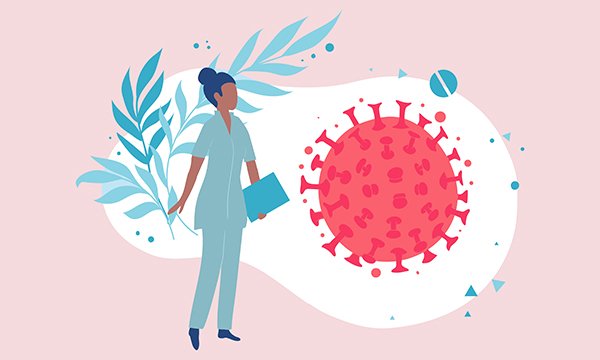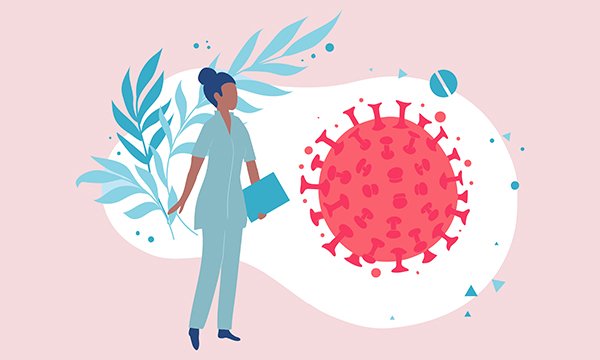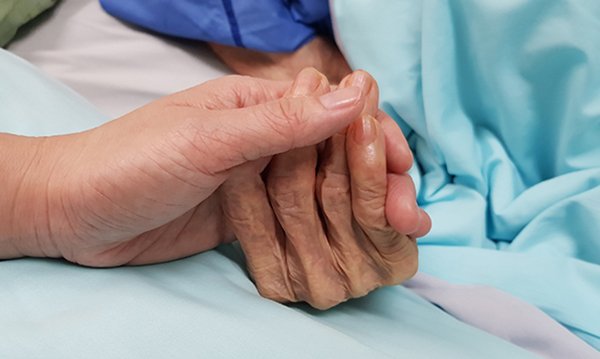Nursing associates: how to turn challenges into learning opportunities

How the challenges thrown up by COVID-19 will shape me as a nursing associate

In March 2020, I had been a trainee nursing associate for just over a year and I thought I had everything under control.
But none of us saw COVID-19 coming.
I was working on a frailty ward at Warwick Hospital, which was my base ward for my two-year course. My training included three external placements a year, and we had one protected learning day each week when we could arrange to go to another clinical setting or work with a specialist team.
Disruption to training came with opportunities to learn
When COVID-19 started, our training shifted very quickly; we weren’t allowed to leave the ward unless redeployed to COVID wards, and with many staff members off sick, it was nigh-on impossible to get the required skills and competencies signed off.
The influx of medical students on to the ward, who had signed up to work as healthcare assistants, also meant new staff to train on the job. But this was a good opportunity for me to practise my teaching skills, and I was also able to tap into the knowledge and skill set of the third-year nursing students who had chosen to opt-in to an extended clinical placement on the ward.
Caring for patients with dementia during a pandemic
As many of the patients have cognitive impairment, caring for them during the height of the pandemic was challenging. Patients with dementia couldn’t understand why visitors were not allowed or why I was wearing full personal protective equipment (PPE). They struggled to understand me through my mask, and it was hard trying to explain to those in side rooms why they couldn’t leave to walk around.
Working with older people, I rely a lot on a tactile approach and have found it difficult not being able to hold my patients’ hands, particularly one older patient who was nearing the end of her life.
‘Training as a nursing associate during a global pandemic was incredibly challenging at times’
She was becoming increasingly distressed, so I sat with her and brushed her hair, put some music on and sang to her. She started to appear calmer but wasn’t entirely settled, so I held her hand with my gloves on.
But the patient was still agitated and seemed frightened, so I decided that what she needed most was human contact. Knowing I could wash my hands well afterwards, I took my glove off and held her hand. She died a few hours later, and when I told her daughter that I sat with her and held her hand, she cried as she thanked me.

A time of fear, dread and sore skin
Infection control became paramount, both at work and at home – I set up a cleaning station by my front door so I could wash my shoes and all my equipment before going into the house and putting my clothes and uniform straight into the wash.
I was showering and washing my hair so often that my hair started to fall out, and my face was sore, red and itchy from the masks and visors. My hands were so cracked and sore that I could barely stand to put my moisturiser on. On my days off, I would put moisturiser on every hour to try and stop my hands cracking and bleeding.
At the start of the pandemic, I was constantly checking the news for updates, but this started to really scare me. It became so bad that I had to turn my phone off and put it away, only looking at the trust communication briefings to ensure I was up to date with policies and procedures. Anything else was too frightening.
Remote learning worked well for me
Studying online, however, was a blessing in many ways; I didn’t have to worry about parking the car or catching a train on time, and I adapted easily to learning online. As lectures were recorded, I could watch them again if anything wasn’t clear, and our lecturers were always available to support us, whether academically, clinically or personally. I will be eternally grateful to them for helping me get through my course.
‘I hope my experiences during the pandemic will make me a better nursing associate’
Training as a nursing associate during a global pandemic was incredibly challenging at times, and I questioned whether I would be able to do it; I contracted COVID twice during 2020 – first in March when there was an outbreak on the ward, and then at Christmas when I was working on a COVID positive ward.
But in December 2020, I am proud to say I qualified. I took up my first post as a registered nursing associate in January 2021, on the frailty ward where I completed most of my training. After a couple of months, I moved to a respiratory ward, where I am working now. By moving away from the ward where I was a student, I am seen as a qualified member of staff, enabling me to develop personally and professionally in a new space.
Advice for newly registered associates
- Try not to compare yourself to others, particularly more-experienced nurses. Everyone is unique and has something different to bring to their practice, there is no ‘better’ way to be
- Don’t be afraid to bring your personality to the bedside. Sometimes I’ve had to figure things out as I’ve gone along but being personable and candid with my patients meant they didn’t mind if things took a bit longer. This can also help build trust and rapport with your patients
- Learn and adapt, but if something works for you, stick with it. I have Irlens syndrome, which means I wear specialist glasses to help on shift. I also struggle with concentration, so rely on lists to get me through the day. I’ve developed my own handover and note-taking sheets to aid this process, which makes my shifts feel much smoother
- Ask, ask some more, then ask again – no question is stupid or too small. We must work within our competencies and our remit to comply with the Nursing and Midwifery Council code, so if you don’t know, just check, or ask someone if you can run your thought process past them. If they suggest something you haven’t thought of, it’s not that you don’t know what you are doing, just that they have a different perspective
- When things get tough, stop and take a moment to breathe and ground yourself. Think about what needs doing right now, what is the most important thing? Start with that job, then move on to the next
- As a final-year student, you probably had everything perfected. But once you are qualified and have your own patients, your time management is likely to go out of the window, so don’t be surprised if everything seems to take twice as long to complete. Things will get smoother with time, just give yourself that time
Transition to registered practice
The trust’s practice development team oversee all newly qualified nursing staff and are always on hand to offer advice and support; during the pandemic, they set up online meetings using Microsoft Teams where we could ‘drop in’ as needed. The team also run the trust’s preceptorship programme, which helps ease the transition from student to newly qualified staff member and ensure we are confident and competent in our roles.
I am also grateful to my colleagues for their support, and for ensuring I have never felt alone. I am exceedingly lucky; I have had COVID and recovered, and my family and friends remain safe, but I have experienced loss and have cried in the hospital chapel.
As the world moves forward, and we learn to recover from this virus that will never truly disappear, I hope my experiences during the pandemic will make me a better nursing associate than I ever hoped to be.
Related articles
- Why we’re glad we opted in to paid clinical placements to help NHS during COVID-19
- Nursing in survival mode: how to stop your stress turning into distress
- Remote learning: how to keep training on track

